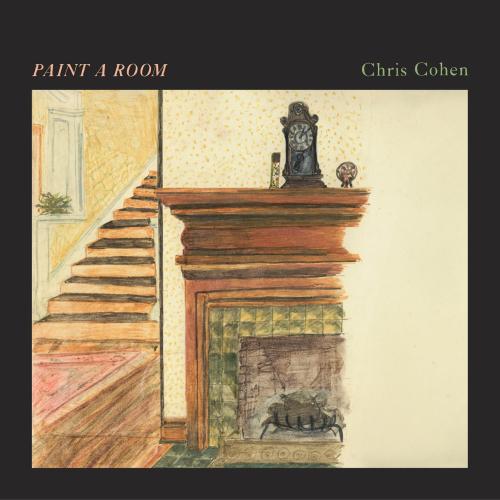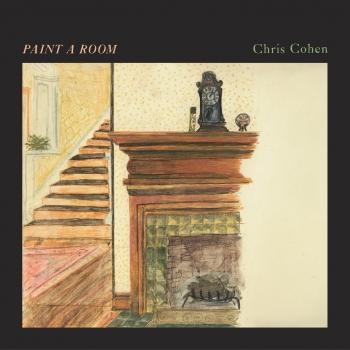
Paint a Room Chris Cohen
Album info
Album-Release:
2024
HRA-Release:
12.07.2024
Album including Album cover
I`m sorry!
Dear HIGHRESAUDIO Visitor,
due to territorial constraints and also different releases dates in each country you currently can`t purchase this album. We are updating our release dates twice a week. So, please feel free to check from time-to-time, if the album is available for your country.
We suggest, that you bookmark the album and use our Short List function.
Thank you for your understanding and patience.
Yours sincerely, HIGHRESAUDIO
- 1 Damage 03:04
- 2 Paint a Room 03:08
- 3 Sunever 02:40
- 4 Cobb Estate 03:04
- 5 Laughing 02:54
- 6 Wishing Well 02:38
- 7 Dog's Face 03:09
- 8 Night or Day 03:19
- 9 Physical Address 02:26
- 10 Randy's Chimes 02:43
Info for Paint a Room
Chris Cohen was always a quiet kid. In fact, this introversion was one reason he began playing music as a toddler—to communicate without speaking to identify with others without the direct representation of words. It has worked, too, with Cohen’s terrific stint in the mighty Deerhoof and his own captivating art-rock act The Curtains, preceding production and session work for the likes of Weyes Blood, Kurt Vile, Le Ren, and Marina Allen. Somewhere along that long way, Cohen started writing lyrics. He found that, though it didn’t come naturally, the process offered a new sense of self-discovery and reckoning, a way to see himself and the world from unexpected angles. His three twilit albums of casually complicated pop during the last decade radiated these epiphanies: handling family strife, navigating advancing age, and understanding social woes.
But Cohen has never had as much to sing so directly as he does on Paint a Room, his first album in five years and his debut for Hardly Art. If Cohen’s meanings have previously lurked inside the tessellated musical layers he built alone, they are newly clear and resonant here, animated and underscored for the first time by a band playing in real time. There is the endless miasma of state violence on the subversively melodious opener “Damage,” the existential exhaustion of modernity on the horn-traced jangle “Laughing”: this is Cohen communicating with friends not only through his deep understanding of groove, harmony, and hook but also with his listeners through songs that croon of our uneasy little era.
In the past, Cohen made records in spells of isolation, phases when, as he puts it, he would “try to make my world a lot smaller.” He would play any of a dozen or so instruments until he stumbled upon something interesting, then slowly build upward and outward upon the idea. The method was solitary and stepwise, an act of accretion and deletion.
Cohen, though, has been playing live with bassist Davin Givhan, drummer Josh da Costa, and keyboardist Jay Israelson in some fashion for the better part of a decade. This time around, then, he built demos in the dusty garage of the suburban Altadena rental that smelled like old wood and gasoline and tried something new—he took the songs on tour with that crew, yielding total control by letting them fill in or flourish their own parts as they saw fit. They came back home and began recording as a band.
Cohen even called in a few friends to help, with Jeff Parker contributing the fluttering horn arrangement on “Damage,” and Parker collaborator Josh Johnson (who produced Meshell Ndegeocello’s Grammy-Award-winning album The Omnichord Real Book) supplying flute, sax, and clarinet arrangements throughout the record. It felt a little bit like producing someone else’s records, with Cohen given the chance to step back and evaluate others’ contributions to his own songs rather than scrutinize every little bit he made himself. This was a longtime ambition realized, another way of relating to others openly through sound.
Cohen, really, has never sounded so assured on a solo album, gliding above or sinking into this band that boasts a preternatural sense of feel. On “Damage,” as he surveys the way we lord power over people with less of it in most every walk of life, his voice lifts above Johnson’s horns like he’s looking for a way out. Cohen wrote “Sunever” for a transgender child in his life, while considering the violence that hard-and-fast categories can create. This song reminds us that we are “always in between,” that transitions are just a part of life. With the hook, he sweetly sings his vow: “You’re gonna find a way.” Cohen is tender and vulnerable in the lead, his voice cracking with feeling as the tune presses forward toward a better future. Written by cutting and pasting phrases from the unemployment form he filled out at the pandemic’s start, the frolicking “Physical Address” considers what it is we all want for our lives, how we untether ourselves from the past in the present. On Paint a Room, Cohen’s music feels like a warm spring breeze, easy to love and gentle to feel. But it’s often carrying something heavy, as if blowing in from some unseen storm cloud.
Cohen had another hobby as a kid: transcendental meditation, a practice his parents taught him when he was six. It’s still part of his life, a window into observing his thought processes, habits, and relationship to the rest of the world. Making music—and, turns out, writing lyrics for it—works in a similar way for Cohen, as he’s able to understand and then articulate notions that wouldn’t be so easy with the absolutism of mere words. Paint a Room both reckons with reality and conjures an alternate one, where nighttime walks and a neighbor’s wind chimes offer endless escapes for the imagination, space for the mind to roam. Sublime and sunlit, these 10 songs consider dreamy new ways out of old predicaments, clearly stating the problem and dancing and singing their way somewhere new.
Chris Cohen
Chris Cohen
Chris Cohen’s songs initially sound easy. They’re each tiny jewels that unfurl at a leisurely pace, but dig a little deeper and you’ll reach a melancholy core. His previous two albums — 2012’s Overgrown Path, and 2016’s As If Apart — were built from lush, blurry tracks that embedded themselves in your subconscious, like they’d always been there.
Chris Cohen, his third solo album, was written and recorded in his Lincoln Heights studio and at Tropico Beauties in Glendale, California over the course of the last two years. Cohen would sing melodies into his phone, fleshing them out on piano, then constructing songs around the melodies, and later, adding lyrics and other instrumentation with the help of Katy Davidson (Dear Nora), Luke Csehak (The Lentils), Zach Phillips, and saxophonist Kasey Knudsen, among others. It is his most straightforward album yet, but it is also the conclusion of an unofficial cycle that began with Overgrown Path.
“My parents got divorced while I was making this record,” he says. “They were married for 53 years and my father spent most of his life in the closet, hiding both his sexual identity and various drug addictions. For me it was like being relieved of a great burden, like my life could finally begin.” It is this sense of truth and freedom that is woven into the very fabric of the record even as it grapples with complicated emotions. Indeed, a core truth of the record is what at first seems like a simple idea: “I hoped that by writing about what was closest to me at the time, I might share something of myself and where I came from,” Cohen says.
Though the album is undeniably part of the framework that made up his previous two records — Chris Cohen is also a thoughtful, accomplished meditation on life and family, backed by dusky instrumentation influenced by the late evening beauty of Pat Metheny’s Falcon and the Snowman soundtrack, and Thomas Dolby’s Golden Age of Wireless. It’s beautiful, but it’s also unflinching in its depiction of emotional turmoil.
On “Edit Out,” written in the wake of his parents’ divorce, Cohen examines his relationship with his father through devastatingly straightforward lyrics: “We were loved from afar / Everyone kept in the dark.” Though it’s a gorgeous song, the emotional weight is immense. A line like “people want a lot” carries a substantial amount of power, even if the initial intention of the lyric is not immediately clear.
But Chris Cohen is not a confessional record in the traditional sense. Instead of picking at open wounds, the album looks forward by embracing the past. Cohen’s father worked in the music industry, which exposed him as a child to not just the practical realities of a career in music — from a young age he saw plenty of recording studios and heard stories about musicians from his parents — but the more creative as well. “I had the sense that music was important and was something I could do,” he says.
On album opener, “Song They Play,” Cohen revisits his childhood, and his attempts to get his father’s attention. “I was mostly shielded from what was going on,” he says. “but had occasional glimpses into my parents’ complex world. When I sing these songs, I think it’s my way of communicating what I am unable to communicate in real life.”
None of these songs are abrasive or even aggressive. The soft drum fills on “Song They Play” comfort, and the guitar virtually glitters. Chris Cohen is a beautiful album about pain and loss but it’s also about accepting loss. Of the song “Green Eyes,” Cohen says “[It’s about] the men in my family and how they passed their worldview along to each other from great emotional distances. My father and grandfather were full of secrets and longing, which were communicated through everyday actions like driving a car or cooking a meal. We all wanted closeness, but never found it in each other.” This is a statement about a specific song, but it is also a statement about the album as a whole: Chris Cohen is not so much autobiographical as it is multi-generational.
This album contains no booklet.












